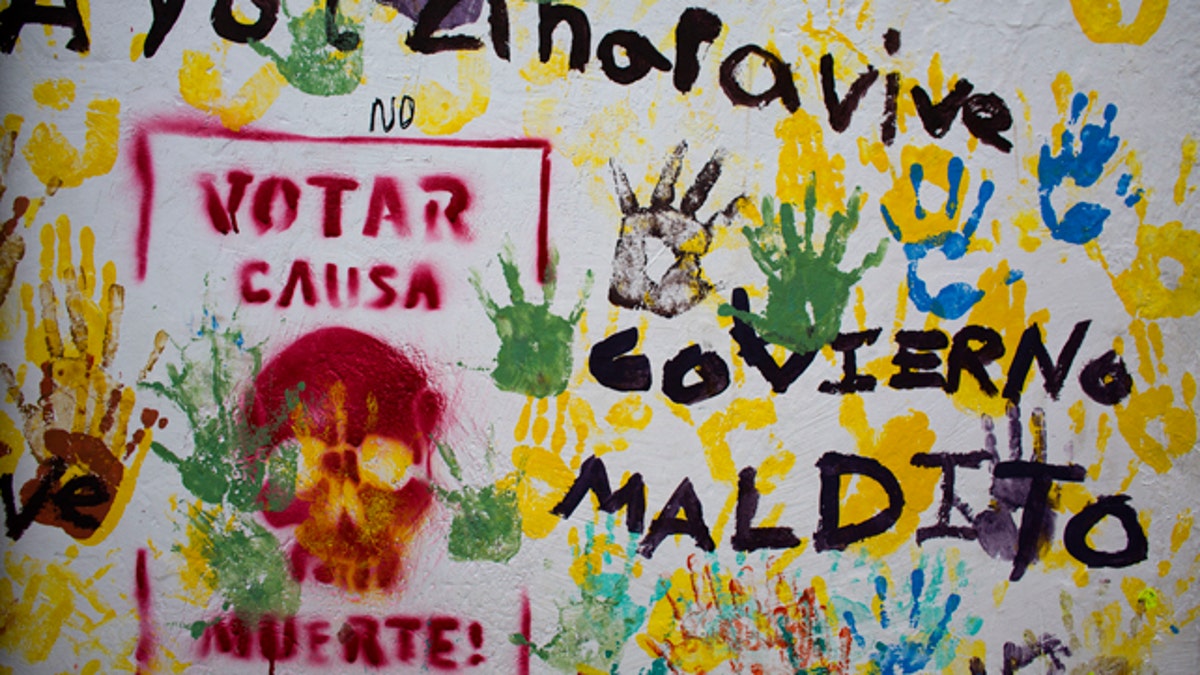
Graffiti in the central square of Tixtla, home of the rural normal school at Ayotzinapa, reads "Ayotzinapa lives. Voting causes death. Cursed government," in Tixtla, Mexico, Saturday, June 6, 2015. A day ahead of elections, a community group, many with faces covered by bandanas, stopped all traffic entering and leaving the Guerrero state town of Tixtla along one main road, to search for and burn any campaign or election materials. (AP Photo/Rebecca Blackwell)
MEXICO CITY (AP) – Thousands of soldiers and federal police were deployed to guard polling stations in conflictive southern states as voting began Sunday for what could be Mexico's most violent elections in years, seen as a litmus test for President Enrique Pena Nieto's government.
Midterm elections like Sunday's, which will choose all 500 seats in the lower house of Congress, nine of 31 governorships and hundreds of mayorships and local posts, usually don't draw much turnout or attention. But a loose coalition of radical teachers' unions and activists has vowed to block the elections.
In the weeks leading up to the vote, they attacked the offices of political parties in Chiapas and Guerrero, and burned ballots in Oaxaca. Those three states are expected to be the focus of unrest Sunday.
The teachers are demanding huge wage hikes, an end to teacher testing, and the safe return of 42 missing students from a radical teachers' college. Those students disappeared in September, and prosecutors say they were killed and incinerated by a drug gang. One student's remains were identified by DNA testing.
In some towns such as Tixtla, Guerrero, students, teachers and parents of the disappeared urged Mexicans to boycott the vote.
"We want the children to be found first, and then there can be elections," said Martina de la Cruz, the mother of one of the missing students.
The military and police deployment was announced on Friday.
"Mexicans have the right to vote in peace," presidential spokesman Eduardo Sanchez said Saturday, noting the government "will take all necessary measures within the framework of legality" to protect the elections.
Most of the nine governors' races were too close to call, and in at least one race — for the governorship of the northern border state of Nuevo Leon — an independent candidate was a top contender, all of which is novel for Mexico.
"There is an enormous amount of competition, and that is good news," said Luis Carlos Ugalde, the country's former top electoral official.
The vote comes amid widespread discontent with politicians in Mexico, where a series of corruption scandals, a lackluster economy and human rights concerns related to the missing students and suspected army massacres have tarnished Pena Nieto's image and fed anti-government protests.
Mexico needs "a complete change in the economic question, in jobs, in security," said Juan Altamirano, a 52-year-old resident of the capital, adding that he intended to vote later and supports two leftist opposition parties. "Things are going badly; we have been moving backward."
On a national level, the Pena's Nieto's Institutional Revolutionary Party is seeking to preserve its commanding position in Congress, despite the president's diminished popularity.
Violence ahead of the elections has already claimed the lives of three candidates, one would-be candidate, and at least a dozen campaign workers or activists.
Candidates have been assassinated in the past, but the threat to block elections is a new phenomenon.
Ugalde saw another threat in the possibility of post-election legal challenges, in part because new electoral laws highly regulate campaign funding, advertising and spending, and make violations a cause for potentially overturning results.
"These may be the elections with the most post-electoral conflicts in Mexico's history," Ugalde said.












































